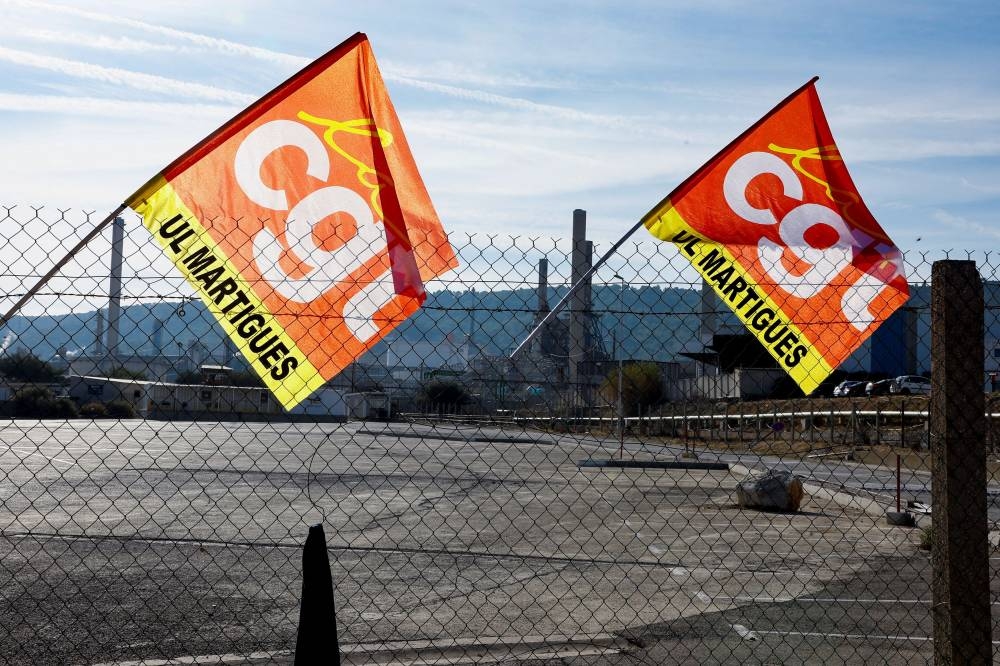PARIS, Oct 11 — France’s hard left CGT trade union threatened “war” against President Emmanuel Macron if he forced refinery strikers back to work, as the government sought to end the industrial action that has left a third of the country’s fuel stations running low.
The government today said it was ready to intervene to end a weeks-long strike in refineries and fuel depots that has also tightened global diesel supplies.
The walkouts and unplanned maintenance at refineries in France run by oil majors TotalEnergies and ExxonMobil have forced more than 60 per cent of national refining capacity offline and blocked distribution from fuel depots.
“This has gone on too long,” Finance Minister Bruno Le Maire told franceinfo radio, hours after Prime Minister Elisabeth Borne held a crisis meeting with ministers late yesterday.
Le Maire said the government was ready to dip once again into strategic fuel reserves and order strikers back to work.
“If the deadlock persists we will have no other option but to requisition the means necessary to get the refineries back online and fuel depots open,” he added. “We’re talking hours, days at the most.”
The government’s threat to requisition workers to get refineries operational again and fuel trucks moving drew a furious response from the CGT.
“I can guarantee you that will be war,” senior CGT energy representative Emanuel Lepine told franceinfo radio. “If Macron wants this to spread to other parts of the economy, then let him do it.”
The strikes come against a backdrop of growing worker unrest over wages in Europe as households struggle with soaring energy and food bills, but the refineries strike is one of the longest walkouts in Europe since the cost-of-living crisis intensified this year.
The industrial action has caused snaking queues at French service stations and sent diesel refining margins to record highs in Europe and the United States

Shortages
TotalEnergies’ 240,000 barrel-per-day (bpd) Gonfreville refinery is offline, while deliveries of refined products are blocked at the 119,000-bpd Feyzin refinery, which is closed for unplanned maintenance but has fuel in storage, and at the Cote d’Opal and La Mede fuel depots.
Two Exxon Mobil refineries have also been out of action since late September.
France is ramping up imports to cover the production shortfall.
Diesel imports for the first 10 days of October were 37 per cent higher than the whole of October last year, Vortexa senior market analyst Pamela Munger said.
Exxon Mobil’s French business, Esso France, said it had reached a salary deal with unions on Monday. Even so, it would take time for supplies to be released, said Transport Minister Clement Beaune.
Esso France said the CFE-CGC and CFDT unionised workers, who represent a majority at its sites, had agreed to an offer for a 6.5 per cent salary increase in 2023 and a €3,000 (RM13,623) bonus. Those terms meant an overall wage increase of 10.7 per cent plus €4,000 in bonuses over the period from January 1, 2022, to December 31, 2023, the group added.
The Exxon wage deal is among the most generous offered to workers in Europe, based on recent pay deals, and may worry companies and policymakers alike that it sets a precedent for negotiations elsewhere.
Even so, the CGT said it had not signed off on the deal with Exxon, and that its workers remained on strike. It is demanding a 10 per cent rise in the next round of wage hikes.
TotalEnergies on Monday offered to bring forward 2023 wage negotiations but only on condition that the strikes end. The CGT denounced the offer as “blackmail”.
The strikes have exacerbated discontent within trade unions towards Macron, who this autumn delayed a final decision on his contested plans for pension reforms, wary of frustration over the cost-of-living crisis. — Reuters






















